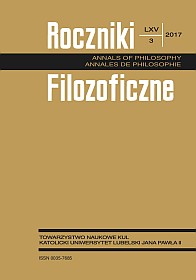Eriugena’s De Praedestinatione: The Project of Rationalisation of Faith and Its Critics
Abstrakt
Eriugeny De praedestinatione — projekt racjonalizacji wiary i jego krytycy
De praedestinatione Eriugeny miało być jego głosem w kontrowersji wywołanej przez Gottschalka z Orbais wokół predestynacji. Dzieło to, choć odrzucało poglądy Gottschalka na temat podwójnej predestynacji, spotkało się z ostrą krytyką i potępieniem. Jednym z powodów takiego stanu rzeczy było niewątpliwie Eriugeny specyficzne rozumienie wolności woli, czemu przyjrzę się w innym tekście. Tutaj chciałabym się skupić na drugiej, istotnej przyczynie odrzucenia dzieła Eriugeny, którą był — jak sądzę — jego prescholastyczny projekt racjonalizacji wiary w duchu św. Augustyna, ale z zastosowaniem „metody” Boecjusza i Capelli. Wydaje się, że współcześni Eriugeny nie byli jeszcze gotowi na przyjęcie jego idei vera philosophia, która zarazem jest vera religio. Mistrzami Eriugeny byli tutaj Ojcowie Kościoła i jego intencją było kontynuowanie na swój własny sposób ich drogi zrozumienia wiary.
Bibliografia
Bower, Calvin M. “Quadrivial Reasoning and Allegorical Revelation: ‘Meta-Knowledge’ and Carolingian Approaches to Knowing”. In Carolignian Scholarship and Martianus Capella. Ninth-Century Commentary Traditions on ‘De Nuptiis’ in Context. Edited by Mariken Teeuwen and Sinéad O’Sulivan, 57–73. Turnhout: Brepols, 2011.
Cappuyns, Maïeul. Jean Scot Erigène. Sa vie, son œuvre, sa pensée. Louvain, Paris: Abbaye du Mont César, Desclée de Brouwer, 1933.
Carabine, Deirdre. John Scottus Eriugena. Oxford: Oxford University Press, 2000.
Carruthers, Mary. The Craft of Thought. Meditation, Rhetoric and the Making of Images, 400-1200. Cambridge: Cambridge University Press, 1998.
Cochrane, Laura E. “Secular Learning and Sacred Purpose in a Carolingian Copy of Boethius’s De Institutione Arithmetica (Bamberg, Staatsbibliothek, Msc. Class 5).” Peregrinations: Journal of Medieval Art and Architecture 5(1) (2015): 1–35.
Cristiani, Marta. “La notion de loi dans le De praedestinatione de Jean Scot.” In Jean Scot Erigène et l’histoire de la philosophie. Edited by René Roques, 277–288. Paris: Editions du C.N.R.S, 1977.
D’Onofrio, Giulio. “‘Disputandi disciplina.’ Procédés dialectiques et ‘logica vetus’ dans le langage philosophiques de Jean Scot.” In Jean Scot — écrivain. Edited by Guy H. Allard, 229–63. Montréal, Paris: Bellarmin, Vrin, 1986.
Dutton, Paul E. “Eriugena, the Royal Poet.” In Jean Scot — écrivain. Edited by Guy H. Allard, 51-80. Montréal, Paris: Bellarmin, Vrin, 1986.
Dutton, Paul E., and Herbert L. Kessler. The Poetry and Paintings of the First Bible of Charles the Bald, Ann Arbor: The University of Michigan Press, 1997.
Ganz, David. “The Debate on Predestination.” In Margaret Gibson and Janet Nelson, eds. Charles the Bald: Court and Kingdom, 283–302. Oxford: BAR, 1981.
Huygens, Robert Burchard Constantyn.“Mittelalteriche Kommentare zum O qui perpetua.” Sacris Erudiri 6 (1954): 373–426.
Jaeger, Stephen. The Envy of Angels. Cathedral Schools and Social Ideals in Medieval Europe 950-1200. Philadelphia: University of Pennsylvania Press, 1994.
Kijewska, Agnieszka. “Divine Logos in the Hart of Boethius’s Path toward Summum Bonum.” Revista Española de Filosofia Medieval 21 (2014): 39-52.
Kijewska, Agnieszka. “Edukacja karolińska”. In: Czasy katedr — czasy uniwersytetów. Źródła jedności narodów Europy. Edited by Wiesława Sajdek, 165–80. Lublin: Wydawnictwo KUL, 2005.
Kijewska, Agnieszka. “Eriugena and the Twelfth Century: The Concept of Ratio”. In Eriugena and Creation. Edited by Michael I. Allen and Willemien Otten, 393-425. Turnhout: Brepols, 2014
Kijewska, Agnieszka. “Mathematics as a Preparation for Theology: Boethius, Eriugena, Thierry of Chartres.” In Boèce ou la chaîne des savoirs. Edited by Alain Galonnier, 625–47, Paris, Louvain: Peeters, 2003.
Love, Rosalind C. “The Latin Commentaries on Boethius’s De Consolatione Philosophiae from the 9th to the 11th Centuries.” In A Companion to Boethius in the Middle Ages. Edited by Noel Harold Kaylor, Jr., and Philip Edward Phillips, 75–133. Leiden, Boston: Brill, 2012.
Luhtala, Anneli. “On Early Medieval Divisions of Knowledge.” In Carolignian Scholarship and Martianus Capella. Ninth-Century Commentary Traditions on ‘De Nuptiis’ in Context. Edited by Mariken Teeuwen and Sinéad O’Sulivan, 75–98. Turnhout: Brepols, 2011.
Madec, Goulven. “L’augustinisme de Jean Scot dans le De praedestinatione.” In Jean Scot Erigène et l’histoire de la philosophie. Edited by René Roques, 183–90. Paris: Editions du C.N.R.S, 1977.
Masi, Michael. Boethian Number Theory: A Translation of the De Institutione Arithmetica. Amsterdam: Rodopi, 1983.
Marenbon, John. “Eriugena on Damnation in De praedestinatione.” In Philosophie et théologie chez Jean Scot Erigène. Edited by Isabelle Moulin, 161–77. Paris: Vrin, 2016.
Marenbon, John. “John Scottus and Carolingian Theology: From the De Praedestinatione, its background and its critics, to the Periphyseon.” In Aristotelian Logic, Platonism and the Context of Early Medieval Philosophy in the West. Edited by John Marenbon, 303–25. Ashgate: Variorum, 2000.
McKitterick, Rosamond. “Charles the Bald (823-877) and His Library: The Patronage of Learning.” The English Historical Review 95 (1980), 374: 28–47.
Michałowska, Monika. “Grammar and Theology in Eriugena’s Philosophy.” Philotheos 7 (2007), 272-78.
Moran, Dermot. The Philosophy of John Scottus Eriugena. A Study of the Idealism in the Middle Ages. Cambridge: Cambridge University Press, 1989.
Steckel, Sita. “Between Censorship and Patronage: interaction between Bishops and Scholars in Carolingian Book Dedications”. In Envisioning the Bishops: Images and the Episcopacy. Edited by Sigrid Danielson and Evan A. Gatti, 103–26. Turnhout: Brepols, 2014.
Thompson, Jeremy C. “God’s Own Dwelling Place: Oppositions of Nature in the Ninth-Century Predestination Debate”. In Eriugena and Creation. Proceedings of the Eleventh International Conference on Eriugenian Studies, held in honor of E. Jeauneau. Edited by Michael I. Allen and Willemien Otten, 85–104. Turnhout: Brepols, 2014.
Copyright (c) 2017 Roczniki Filozoficzne

Utwór dostępny jest na licencji Creative Commons Uznanie autorstwa – Użycie niekomercyjne – Bez utworów zależnych 4.0 Międzynarodowe.





